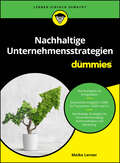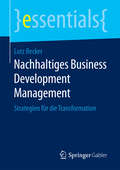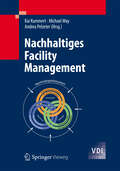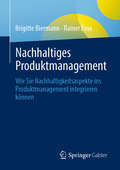- Table View
- List View
Nachhaltige Marktwirtschaft: Eine Erweiterung der Sozialen Marktwirtschaft
by Wolfgang ViewegIn diesem Buch wird die Notwendigkeit einer programmatischen und terminologischen Weiterentwicklung der Sozialen zu einer Nachhaltigen Marktwirtschaft aufgezeigt. Es legt informativ dar, wie der aktuelle Stand bei der fortschreitenden Implementierung und Etablierung ist und welche Probleme entstehen können, wenn der Begriff „Nachhaltigkeit“ unterschiedlich interpretiert wird. Auch die Vorteile, die eine Nachhaltige Marktwirtschaft langfristig mit sich bringt, rücken ins Blickfeld. Dabei betrachtet der Autor zunächst Deutschland, aber notwendigerweise auch die globale Ebene: Umwelt- und Klimaschutz sind kein ausschließlich nationales Thema. Das deutsche Wirtschafts- und Gesellschaftsmodell der Sozialen Marktwirtschaft hat sich in den vergangenen 60 Jahren bestens bewährt – aber im Laufe der Jahrzehnte ist sie allmählich zu eng geworden und braucht nun unbedingt eine Erweiterung.
Nachhaltige Personal- und Organisationsentwicklung (essentials)
by Katrin KellerDieses Buch beschäftigt sich mit wertschätzenden und verantwortungsbewussten Unternehmensstrategien der Zukunft, die sich an den Mitarbeitenden orientiert. Mit einer solchen Haltung kann es gelingen, ein langfristig attraktives Unternehmenssystem für Mitarbeitende aller Generationen zu schaffen. Das Buch soll ermuntern, irritieren und kreative individuelle sowie organisationale Möglichkeiten in sich verändernden berufsbiografischen sowie unternehmerischen Prozessen aufzeigen.
Nachhaltige Personalentwicklung und Weiterbildung: Betriebliche Seminare und Trainings entwickeln, Erfolge messen, Transfer sichern
by Simone KauffeldDieser Praxisleitfaden hilft, Maßnahmen der Personal- und Kompetenzentwicklung sowie der beruflichen Weiterbildung bedarfsgerecht, effizient und nachhaltig zu entwickeln und durchzuführen. So sichern Sie den Erfolg von Trainings, Seminaren und Workshops langfristig! – Neben Anleitungen zur Entwicklung und Durchführung von Seminaren (Bedarfsanalyse, konkrete Tipps aus den wichtigsten Lerntheorien und der Personalpsychologie, Trainingsformen) vermittelt dieses Buch Instrumente zur Trainingsevaluation und Transfer-Sicherung auf verschiedenen Ebenen (Teilnehmer, Training, Arbeitsumgebung), außerdem wird die Rolle der Führungskräfte für den Lerntransfer beleuchtet. Es kommt praxisnah auf den Punkt und enthält Checklisten, Fallbeispiele, Tipps zur Software-Unterstützung (Learning-Management-Systeme) sowie Arbeitsmaterialien zum Download. Ein Buch für Trainer, Trainingsentwickler, Seminaranbieter, Weiterbildungseinrichtungen, Personalentwickler und Personalleiter.
Nachhaltige Rückbau- und Entsorgungsplanung: Erarbeitung eines Rückbau- und Entsorgungskonzeptes im Bereich des Einzelhandels (Entwicklung neuer Ansätze zum nachhaltigen Planen und Bauen)
by Jonas ScharkeDas Buch beschreibt die Herangehensweise an die Entsorgung- und den Rückbau im Einzelhandel unter vorrangig ökologischen Gesichtspunkten. Hierbei stehen die Strukturierung und die Ablaufplanung des Rückbaus im Kontext der Einzelhandelsexpansion im Fokus. Dies umfasst die Darstellung und Berücksichtigung auftretender Besonderheiten sowie hieraus entwickelte Lösungsvorschläge im praktischen Umgang. Das entstehende Konzept dient dabei als Wegweiser für Unternehmen, perspektivisch nachhaltige Aspekte in der Rückbauplanung zu manifestieren.“
Nachhaltige Unternehmensführung
by Kim Oliver Tokarski Jochen Schellinger Philipp BerchtoldDieser Herausgeberband setzt sich empirisch und theoretisch mit verschiedenen Aspekten einer nachhaltigen Unternehmensführung auseinander. Fortwährendes weltweites Bevölkerungswachstum und zunehmender Konsum zusammen mit wachsender Globalisierung führen dazu, dass die in unserer Umwelt vorhandenen natürlichen Ressourcen ohne gegensteuernde Maßnahmen irgendwann erschöpft sein werden. In dieser Situation wird eine strategische Führung von Unternehmen und Organisationen immer wichtiger, die ausgehend von den drei Nachhaltigkeitsperspektiven „Ökonomie“, „Ökologie“ und „Soziales“ alle relevanten Stakeholder einbezieht. Ziel sollte eine generationenübergreifende Entwicklung sein, in der die Bedürfnisse der gegenwärtigen Generation befriedigt werden, ohne dass dies auf Kosten zukünftiger Generationen geschieht. Auf dieser Grundlage greifen die Autoren aktuelle, praxisrelevante Fragestellungen auf, schildern konkrete Fallbeispiele und geben Handlungsempfehlungen. Die Bandbreite reicht von einer grundlegenden Diskussion ethischer Prinzipien internationaler Unternehmen über wertorientierte Steuerungskennzahlen und eine nachhaltige Beschaffung in der Lebensmittelbranche bis hin zur Logistikgestaltung in Smart Cities.
Nachhaltige Unternehmensstrategien für Dummies (Für Dummies)
by Meike LernerMit der richtigen Nachhaltigkeitsstrategie auf Erfolgskurs Es gibt viele Gründe für Unternehmen, Nachhaltigkeit strategisch zu implementieren. Nicht nur Kunden, Mitarbeiter und Partner legen zunehmend Wert auf nachhaltiges Wirtschaften. Auch viele gesetzliche Vorgaben verlangen von Unternehmen ein nachhaltiges Handeln ? etwa die EU-Taxonomie-Verordnung, das Lieferkettensorgfaltsgesetz oder die Corporate Sustainability Reporting Directive. Und schlie?lich blicken auch Geldgeber im Rahmen ihrer Risikoanalyse sehr genau auf die Nachhaltigkeitsbemühungen von Unternehmen. Wie Ihr Unternehmen Schritt für Schritt auf allen Ebenen nachhaltiger wird und Sie die gesetzlichen Anforderungen einhalten, erfahren Sie in diesem Buch. Sie erfahren Wie Sie die Sustainable Development Goals strategisch setzen Wie Sie eine gesetzeskonforme Nachhaltigkeitsberichterstattung installieren Wie Sie ein nachhaltiges Beschaffungswesen etablieren Wie Sie ein Green Office einrichten
Nachhaltige Vergütung von Bankvorständen: Theorie, Empirie und praktische Umsetzung
by Wieland Achenbach Patricia Feldhoff Karl E. DürselenDieses Buch leistet einen wertvollen Beitrag zur Diskussion über eine mehr als früher nachhaltige Vergütung von (Bank)Vorständen und zwar aus Share- wie Stakeholdersicht. Ausgehend von einer theoretischen Betrachtung (Corporate Governance, Rechtslage und angewandte Vergütungssysteme, Nachhaltigkeit und Kriterien, wird mittels einer Befragung unter (Geno)Bankaufsichtsräten (sowie auch Privatbanken und Sparkassen) ein Überblick über die jetzige Form der Vorstandsvergütung erheben. Darauf basierend werden Kriterien und Kennzahlen einer nachhaltigen Vergütung entworfen und begründet. Der Autor unterbreitet sodann mit Hilfe der Balanced-Scorecard-Methode einen Vorschlag zur Integration der Nachhaltigkeitskriterien in die Vorstandsvergütung.
Nachhaltige Websites: Praktischer Leitfaden zur Prüfung und Optimierung – mit zahlreichen Tool-Tipps und Programm-Codes
by Torsten BeyerDieses Buch bietet einen praktischen Leitfaden für das Design, die Entwicklung und den Betrieb energieeffizienter Webseiten. Torsten Beyer hat eine konkrete Schritt-für-Schritt-Anleitung entwickelt, die zur Optimierung bestehender Seiten als auch vor dem Website-Relaunch nutzbar ist. Dabei werden die Ziele und Ansätze diverser Initiativen, u.a. die SDG-Klimaziele der Vereinten Nationen, die Prinzipien der Corporate Digital Responsibility und das von Web-Designern formulierte Sustainable Web Manifesto berücksichtigt.Durch die Optimierung von Bildern, Videos, Schriften, Skripten und Seitentemplates sowie der Konfiguration des Webservsers lässt sich das Datenvolumen mit einfachen Mitteln und ohne Qualitätseinbußen substanziell reduzieren. Als Nebeneffekt werden die Ladezeiten geringer, was zu besseren Rankings in Suchmaschinen und einer höheren Nutzerzufriedenheit führt. Kostenersparnis, Ranking-Verbesserungen und CO2-Optimierungen können somit Hand-in-Hand gehen.Aus dem InhaltAnalyse des CO2-Fußabdrucks von WebsitesSchritt-für-Schritt-Optimierung: von der Konfiguration des Webservers über Bilder, Icons und Animationen sowie Schriften, CSS, Video-, Audio- und PDF-Dateien, JavaScript und HTML-DateienMit zahlreichen kleinen Programmcode-Tipps zur schnellen Optimierung. Plus erprobte und häufig kostenlose Tool-Tipps zur Prüfung und Optimierung Ihrer WebsiteDas Buch zeigt mit seinen vielfältigen praktischen Tipps, wie Internetseiten selbst mit kostenlosen Hilfsmitteln nachhaltiger und datensparsamer gestaltet werden können. Es richtet sich gleichermaßen an die Betreiber von Webseiten als auch an Agenturen.
Nachhaltige Wirtschaftskonzepte: Strategien - Innovationen - Trends (SDG - Forschung, Konzepte, Lösungsansätze zur Nachhaltigkeit)
by Marc KnoppeDieses Buch beleuchtet verschiedene Themenbereiche im Kontext der Nachhaltigkeit und der verbundenen Sustainable Development Goals. Im Vordergrund stehen dabei die Chancen, die sich aus einer mutigen und weitsichtigen Herangehensweise ergeben.Das Thema Nachhaltigkeit basierend auf den Säulen Soziales, Umwelt und nachhaltiges Wirtschaften gewinnt an Bedeutung. Gesellschaftliche Veränderungen fordern zunehmend nachhaltige Wirtschaftskonzepte und Lösungen, neue strategische Ausrichtungen und Strategiemodelle, um die Wirtschaft auf ein neues Niveau zu führen. Die Wertschöpfungsketten fast aller Branchen werden davon erfasst, was auch starke Auswirkungen auf die einzelnen Wertschöpfungsketten der Unternehmen hat. Moderne Trends wie New Work, neue EU-Regeln, geopolitische Bedrohungen, Umweltkatastrophen und vieles mehr sind Risiken und Chancen zugleich.Das Werk soll Unternehmen Denkanstöße geben, sich neu auszurichten und nachhaltige Wirtschaftskonzepte zu erkennen und zu entwickeln.
Nachhaltige Wohnungswirtschaft in der Schweiz: Erkenntnisse aus Forschung und Praxis
by Christian Kraft Constantin KempfDieses Buch diskutiert die Rolle der Schweizer Wohnwirtschaft in der Nachhaltigkeitsdebatte zwischen Raum, Energie und Gesellschaft. Im Zentrum des Buches stehen angewandte quantitative Forschungsarbeiten. Diese analysieren mit großen Datensätzen die Effizienz der Ressourcenallokation von Land, Energie und Kapital. Mit diesen quantiativen, holistischen Grundlagen bricht das Buch die vorherrschenden Nachhaltigkeitssilos Wirtschaft, Ökologie und Soziales auf und gibt Anregungen zur langfristig zielführenden Gewichtung der Einzelkomponenten für Schweizer Wohnbauinvestitionen. Europäisch vergleichend wird aufgezeigt, inwiefern der Schweizer Wohnungsmarkt trotz großem Handlungsbedarf in vielerlei Hinsicht doch als nachhaltiges Vorbild dienen kann. Gastbeiträge von namhaften Schweizer Unternehmen und Ökonomen runden das Buch inhaltlich ab.
Nachhaltiger Konsum: Best Practices aus Wissenschaft, Unternehmenspraxis, Gesellschaft, Verwaltung und Politik
by Wanja Wellbrock Daniela LudinDieses Buch zeigt, dass wirtschaftliche Entscheidungen nicht mehr ausschließlich anhand von Preis, Qualität und Service getroffen werden können. Nachhaltiger Konsum betrifft dabei nicht nur private Haushalte, sondern auch die öffentliche Beschaffungspraxis stellt eine wichtige Stellschraube zur nachhaltigen Veränderung der Märkte dar. Aus diesem Grund nimmt das Buch eine ganzheitliche Betrachtung des Themas vor. Zudem findet auch keine Begrenzung auf ökologische Aspekte statt, sondern alle drei Säulen der sogenannten Triple Bottom Line – Ökologie, Soziales und Ökonomie – stehen im Mittelpunkt und bieten anhand zahlreicher Best Practices aus Unternehmen eine konzeptionelle Basis für Praktiker, Wissenschaftler und Studierende.
Nachhaltiges Asset Management von Immobilien: Grundlagenwissen und ESG-konforme Anlagestrategien (essentials)
by Gerd Niklas KösterDieses essential liefert eine Einführung in das nachhaltige Asset Management von Immobilien. Damit leistet es einen Beitrag hin zu einer klimaneutralen Immobilienwirtschaft. Neben den wesentlichen Bestandteilen des Asset Managements werden dem Leser hierfür auch die aktuellen Nachhaltigkeitsanforderungen und Klimaschutzgesetze vermittelt. Gleichzeitig wird analysiert, wie sich ESG-Kriterien auf den Gebäudebestand übertragen lassen und trotzdem die Renditeanforderungen der Investoren erfüllt werden können. Insgesamt liefert dieses essential eine umfangreiche Handlungsempfehlung für das nachhaltige Management von Immobilienbeständen aus der Perspektive des Asset Managers.
Nachhaltiges Beschaffungsmanagement: Strategien – Praxisbeispiele – Digitalisierung
by Wanja Wellbrock Daniela LudinVor dem Hintergrund der steigenden Bedeutung ökologischer und sozialer Aspekte entwickelt sich Nachhaltigkeit zu einem immer wichtigeren Wettbewerbsvorteil für Unternehmen. Gerade in der Beschaffung können Entscheidungen nicht mehr ausschließlich anhand der Kriterien Preis und Qualität getroffen werden. Auch Nachhaltigkeitsaspekte sind bei der Lieferanten- und Materialauswahl ein entscheidender Faktor. Dieses Buch bietet erstmals eine umfassende konzeptionelle Basis für das Nachhaltigkeitsmanagement von Beschaffungstätigkeiten, die es Unternehmen ermöglicht, sich eine weitere Kernkompetenz aufzubauen und diese im strategischen und operativen Bereich umzusetzen. Zahlreiche Beispiele aus verschiedenen Wirtschaftszweigen und zum Einfluss der Digitalisierung zeigen zudem sehr anschaulich die Anwendbarkeit in der Praxis.
Nachhaltiges Business Development Management: Strategien für die Transformation (essentials)
by Lutz BeckerLutz Becker stellt in diesem essential sowohl Strategien und Organisation als auch Rolle und Aufgaben des Business Development Managements strukturiert und verst#65533;ndlich vor. Zudem vermittelt der Autor praxiserprobte Methoden des Business Developments. Dabei lenkt er insbesondere den Blick auf Strategien f#65533;r die beiden gro#65533;en gesellschaftlichen und wirtschaftlichen Transformationen, die digitale und die #65533;kologische Transformation.
Nachhaltiges Facility Management
by Andrea Pelzeter Kai Kummert Michael MayUm Nachhaltigkeit im Facility Management zu realisieren, sind praxisgerechte Bezugsgrößen erforderlich. Die Autoren stellen in dem Band eine Definition der Nachhaltigkeit vor, die auf Kennzahlen für das Facility Management basiert und die sie in Kooperation mit Unternehmen erarbeitet haben. Anhand eines IT-gestützten Systems werden die flexible Erfassung, Verwaltung, Messung und Auswertung von Nachhaltigkeitskennzahlen im Unternehmen dargestellt und das Tool in seinen Kernfunktionen beschrieben.
Nachhaltiges Investieren für Frauen: Ihr Geld, Ihre Entscheidung
by Janine FirpoInformieren Sie sich über Finanzen und sozialverträgliches Investieren mit einem frauenzentrierten Ansatz! Das Buch von Janine Firpo bietet die grundlegende Unterstützung, die Frauen brauchen, um miteinander über ihr Geld zu sprechen, zu investieren, um ihr Vermögen zu vermehren und die erforderlichen Maßnahmen zu ergreifen, um ihr Vermögen mit ihren Werten in Einklang zu bringen. Es wurde für kluge Frauen geschrieben, die sich finanziell stark fühlen wollen, und setzt dort an, wo andere Bücher über persönliche Finanzen aufhören. Es liefert die umfassenden Informationen, die Sie benötigen, um fundierte Anlageentscheidungen für Ihr gesamtes Portfolio zu treffen. Das Buch beginnt mit Giro- und Sparkonten und geht dann Anlageklasse für Anlageklasse vor. Es vermittelt Ihnen grundlegendes Anlagewissen und gibt Ihnen konkrete Beispiele, wie und wo Sie Ihr Geld im Einklang mit Ihren Werten anlegen können. Sie müssen es nicht allein schaffen. Als Frauen liegt unsere Stärke in Beziehungen, und dieses Buch wird Ihnen helfen, diese Stärke zu nutzen, um bessere finanzielle Ergebnisse für sich und Ihre Familie zu erzielen. Es hilft Ihnen, Gemeinschaften zu finden, die Sie unterstützen, und versetzt Sie in die Lage, Ihr Wissen mit anderen Frauen zu teilen und die nächste Generation kluger, selbstbewusster und werteorientierter Investorinnen zu fördern. * Verbessern Sie Ihr Verhältnis zu Geld und erkennen Sie die Macht, die Sie haben, um die Welt durch Ihre Investitionsentscheidungen zu verändern. * Entmystifizieren Sie den Finanzjargon, lernen Sie Anlagestrategien und erwerben Sie Werkzeuge, die Ihnen helfen, Ihr Vermögen zu vermehren. * Erforschen Sie wertorientierte Anlagemöglichkeiten und treffen Sie fundierte Entscheidungen darüber, wo Sie Ihr Geld anlegen. * Brechen Sie das Tabu, mit Partnern, Beratern, Freunden und Töchtern über Geld zu sprechen. Anders als jedes andere Buch zum Thema Geldanlage liefert "Activate Your Money" eine fachkundige Anleitung, einen einzigartigen frauenspezifischen Ansatz und einen Schwerpunkt darauf, Gutes zu tun. Ganz gleich, ob Sie gerade erst mit dem Investieren beginnen oder bereits eine erfahrene Anlegerin sind, bietet Ihnen dieses Buch etwas. Nutzen Sie es als Nachschlagewerk, zu dem Sie immer wieder zurückkehren können, um Ihr Wissen, Ihr Selbstvertrauen und Ihr werteorientiertes Portfolio aufzubauen.
Nachhaltiges Leistungs- und Vergütungsmanagement: Entgeltsysteme zwischen Status quo, Agilität und New Pay
by Jürgen WeißenriederDieses Buch über Entgeltsysteme ist ein einzigartiger Begleiter bei der Zielfindung und Ausgestaltung einer zukunftsfähigen Vergütung. Es unterstützt Unternehmen, Führungskräfte, Mitarbeiter und Betriebsräte dabei, leistungsvariable Vergütungssysteme nachhaltig, also langfristig haltbar und wirksam zu gestalten. Die 2., vollständig überarbeitete und erweiterte Auflage berücksichtigt neue Rahmenbedingungen: Welche Anwendungsformen sind geeignet für agile und flexible Organisationen? Entscheiden Teams künftig autonom und ohne Chef über die Verteilung von Monatsentgelt und Bonus? Wie können agile Organisationen die Partizipation der Mitarbeiter bei der Entwicklung und Anwendung von Vergütungssystemen verstärken? Anschauliche Werkstattberichte aus der Praxis liefern viele Umsetzungsmöglichkeiten zur direkten Anwendung im eigenen Unternehmen.
Nachhaltiges Management: Nachhaltigkeit als exzellenten Managementansatz entwickeln
by Anabel Ternès Marco EnglertNachhaltigkeit stellt neue Rahmenbedingungen für das Wirtschaften von Unternehmen dar, vergleichbar mit der IT-Revolution und Globalisierung. Unternehmen, die diesen Paradigmenwechsel erkennen und in ihre Unternehmens- bzw. Innovationsstrategien, Systeme und Prozesse integrieren, sind auf dem richtigen Weg. Nachhaltige Unternehmensführung bzw. Nachhaltiges Management ist ein ganzheitlich integriertes Konzept zur Sicherung der Zukunftsfähigkeit von Unternehmen.Das Buch versammelt grundlegende Texte von Nachhaltigkeitsexperten aus verschiedenen Branchen. Nachhaltigkeit hat in den letzten Jahren durch die disruptiven Veränderungen in Wirtschaft und Gesellschaft, sowie durch Natur- und Umweltkatastrophen stark an Bedeutung gewonnen. Es gilt jetzt, die Entwicklungen von Digitalisierung, Globalisierung und Technisierung mit einem strukturierten Nachhaltigkeitsmanagement zu organisieren und umzusetzen, das verständlich ist und in klare Handlungsanweisungen für den Unternehmensalltag übersetzt werden kann. Nachhaltiges Management in den verschiedenen Bereichen von Wirtschaft und Gesellschaft bedarf klarer Strategien und zielgerichteter Umsetzungen, um den Anforderungen an ein exzellentes, verantwortungsvolles Handeln für die Welt der Zukunft entsprechen zu können.
Nachhaltiges Markenmanagement: Innovative Unternehmenspraxis: Insights, Strategien und Impulse
by Gabriele Schuster Lisa-Charlotte WolterDieses Buch gibt einen Einblick in zentrale Strategien, Erfolgsgeschichten und die Umsetzung von Nachhaltigkeit in einzelnen Unternehmensbereichen. Nachhaltigkeit wird für Konsument:innen immer wichtiger und für Marken ist es von zunehmender Bedeutung, Haltung zu zeigen – in Bezug auf sämtliche Nachhaltigkeitsdimensionen. Denn Marken können einen entscheidenden Teil zum Wandel beitragen, ihn sogar initiieren und lenken. Für Markenmanager:innen ergeben sich damit diverse Herausforderungen und Fragen, u. a. zur Wirtschaftlichkeit nachhaltiger Strategien, zu rechtlichen Aspekten, zur optimalen Positionierung oder zur Glaubwürdigkeit der Maßnahmen.Eine Vielzahl renommierter Expert:innen beleuchtet das Thema in diesem Buch aus unterschiedlichen Perspektiven und für verschiedene Branchen – ein Werk sowohl für Praktiker:innen, als auch für Lehrende und Wissenschaftler:innen, die wertvolle Insights gewinnen wollen.Mit Beiträgen von:Elisa AdamProf. Dr. Nicole BöhmerProf. Dr. Michael BürkerProf. Dr. Sylvia Chan-OlmstedtMichele DilengeJan Dreyer Prof. Dr. Nicole FabischProf. Dr. Christian FeddersenProf. Dr. Michael FretschnerProf. Dr. Eva Ghazari-ArndtProf. Dr. Kai-Michael GrieseProf. Dr. Sandra GronoverBastian HamacherNoa-Sophie JägerDennis KotzoldProf. Dr. Ralf T. KreutzerPhilip MaloneyProf. Dr. Daniel MichelisThomas OttoLavinia Celina Rahmawati Liselotte RingeisAnnette RitterFranziska ScharfeProf. Dr. Benjamin SchulteJule ThömingSina TrumAnn-Katrin VoitHelena Wisbert
Nachhaltiges Personalmanagement als Schlüsselfaktor für erfolgreiches Wirtschaften: Eine linguistische Diskursanalyse ausgewählter Unternehmenstexte und Printmedien (Sprache und Wirtschaft)
by Elisabeth GeursenMit diesem Open-Access-Buch liefert Elisabeth Geursen erstmals Erkenntnisse zum Nachhaltigkeitsbegriff im Personalmanagement, auf den mit „Human Capital“ oder „Human Ressource“ referiert wird, mithilfe primär linguistischer Methoden. Der Nachhaltigkeitsidee wird im deutschsprachigen und internationalen Kontext gesellschaftspolitische Relevanz zugewiesen. Geursen präsentiert im Bereich des gesellschaftlichen Diskurses um nachhaltiges Wirtschaften im Personalbereich prominente Themenkomplexe und deren diskurspezifische Verhandlung in ihrer zeitlichen Entwicklung über einen Zeitraum von 20 Jahren. Hervorzuheben ist der kontrastive Ansatz: Es wird die Themenentwicklung in den Geschäfts- und Nachhaltigkeitsberichten von drei branchenspezifischen Unternehmen, die hinsichtlich ihrer Nachhaltigkeitsaktivitäten besondere massenmediale Aufmerksamkeit erhalten, sowie in überregionalen Printmedien untersucht. Aus den Analyseergebnissen leitet Geursen Handlungsempfehlungen für Akteure ab und demonstriert damit einen starken Praxisbezug. Geursen gelingt eine Erweiterung bisheriger Nachhaltigkeitsforschung in einem wirtschaftswissenschaftlichen Themenfeld durch eine operationalisierte, theoretisch-fundierte diskurslinguistische und framebezogene Methodik (hier dem Verfahren nach Konerding entsprechend).
Nachhaltiges Personalmanagement in der Zahnarztpraxis
by Julia-Katharina JonenVon der Einbehandlerpraxis bis zum MVZ - die Ressource Personal als wichtigster Erfolgsfaktor bestimmt die Handlungsfähigkeit einer Zahnarztpraxis. Dieses Buch soll Grundlagen zum Personalmanagement inkl. Handlungsempfehlungen und Praxisbeispielen liefern. Es liefert "die eigene Personalabteilung" in einem Hands-on-Werk, ohne Vorkenntnisse anwendbar und adressatengerecht umgesetzt. Mit diesem Werk ist jede Praxis in der Lage mit wenig Ressourcen eine eigene Personalabteilung aufzubauen und strukturiert und systematisch umzusetzen. Von der Personalverwaltung, über -gewinnung, -entwicklung und einem Exkurs ins Employer Branding findet sich jeder Fachbereich aus HR wieder. Um das Paket abzurunden werden Leitfäden zur praktischen Anwendung mitgeliefert. Speziell ausgerichtet auf die Besonderheiten einer Zahnarztpraxis.
Nachhaltiges Planen, Bauen und Wohnen: Kriterien für Neubau und Bauen im Bestand (SDG - Forschung, Konzepte, Lösungsansätze zur Nachhaltigkeit)
by Stefanie FriedrichsenDeutschland ist gebaut: Drei Viertel aller Wohngebäude sind über 30 Jahre alt und müssten dringend modernisiert werden. Das Werk bietet einen Überblick darüber, welche Kriterien bei einer umfassenden Modernisierung beachtet werden müssen, um eine wirtschaftlich tragfähige, sozialverträgliche und umweltgerechte Lösung zu finden. Der Schwerpunkt liegt dabei auf Mehrfamilienhäusern. Jedes Kapitel bietet umfangreiche Checklisten, mit deren Hilfe Modernisierungsaufgaben systematisch angegangen werden können.
Nachhaltiges Produktmanagement: Wie Sie Nachhaltigkeitsaspekte ins Produktmanagement integrieren können
by Rainer Erne Brigitte BiermannDas Fachbuch beleuchtet das Thema Nachhaltiges Produktmanagement aus zwei verschiedenen Perspektiven: Zum einen aus der Sicht des Produktmanagements und zum anderen aus der Sicht des Nachhaltigkeitsmanagements. Es spricht damit Interessierte und Experten beider Unternehmensbereiche an.Nach der Darstellung der zentralen Begriffe und Konzepte des Produktmanagements einerseits und der Nachhaltigkeit andererseits anhand von zwei durchgängigen Fallbeispielen werden im dritten Teil Ankerpunkte für eine Integration identifiziert. Die Autoren behandeln dabei auch Themen, die bisher einer Integration beider Aspekte entgegenstehen und zukünftig geklärt werden müssen.Alltagstaugliche Beispiele aus zwei unterschiedlichen Branchen zeigen auf, wie es möglich ist, Nachhaltigkeitsaspekte in das Produktmanagement zu integrieren.
Nachhaltiges Projektmanagement: Verantwortlichkeit und Umsetzung in zukunftsorientierten Organisationen (essentials)
by Ulrich Holzbaur Moritz FierkeDer vorliegende Leitfaden verbindet zwei Megatrends: Projektorientierung und Nachhaltigkeit. Beim Einsatz von Projekten für eine Nachhaltige Entwicklung ist die Nachhaltigkeit das Ziel und das Projektmanagement die Methode, wir haben hier Projekte mit einem gezielten positiven Handabdruck. Komplexer wird es, wenn wir die Berücksichtigung der Nachhaltigkeitsziele bei der Umsetzung und Verfolgung von Projekten betrachten. Wir reden hier technisch vor allem über die Vermeidung eines negativen Fußabdrucks, aber auch planerisch und normativ über die Frage, welche Verantwortung das Projektmanagement hat und wie man Projekte mit einem positiven Beitrag zur Nachhaltigkeit fördern kann. Hierzu geben wir konkrete Hinweise und Leitfäden.
Nachhaltiges Qualitätsdatenmanagement: Bericht zur GQW-Jahrestagung 2022 in Chemnitz
by Sophie GrögerDie Gesellschaft für Qualitätswissenschaften e. V. verfolgt seit Ihrer Gründung im Jahre 1994 das Ziel, Qualitätswissenschaft in Lehre und Forschung zu fördern und den Wissenstransfer in die industrielle Anwendung zu unterstützen. Hierzu werden im Rahmen der Jahrestagungen die aktuellen Ergebnisse aus Forschung und Entwicklung vorgestellt und zukünftige Trends in diesem Bereich thematisiert und diskutiert. Die GQW Jahrestagung 2022 fand unter Leitung von Prof. Dr.-Ing. habil. Sophie Gröger in Chemnitz statt. Unter dem Leitthema „Nachhaltiges Qualitätsdatenmanagement“ wurden zahlreiche Beiträge aus Forschung und Industrie vorgestellt. Diese thematisierten dabei beispielsweise die Integration des ISO GPS-Systems in kleine und mittelständische Unternehmen (KMU), eine Vorgehensweise zur fertigungsprozessorientierten Prüfplanung, aber auch die Verknüpfung von Messdaten und Datenbanken zur Vergleichbarkeit von Messergebnissen. Ebenso wurden die Anwendung von Methoden des maschinellen Lernens und die intelligente Qualitätssicherung durch Bildverarbeitung vorgestellt. Es konnte aufgezeigt werden, wie mit der Verknüpfung von Daten im Bereich der Problemlösung eine Verbesserung aktueller Ansätze (8D-Report) erreicht werden kann. Ein Reifegradmodell zur Bewertung der Datenqualität in Industrie 4.0 und eine Informationsbedarfsanalyse für Verbesserungen im Fehlermanagement in der manuellen Montage ergänzten das Tagungsprogramm. Nicht zuletzt wurden neue digitale Möglichkeiten zum Kompetenznachweis sowohl in der Agrar- und Ernährungswirtschaft als auch im Automotive Bereich diskutiert. Freuen Sie sich also auf ein inhaltlich breites Spektrum interessanter Beiträge aus Forschung und Industrie im Bereich der Qualitätswissenschaften.
























